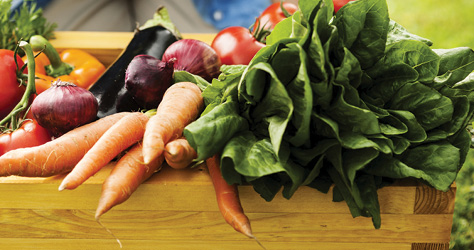Foods to ensure you and your baby are getting all the nutrients you need
Pregnancy is a great time to take a look at your diet and think about what you are feeding both you and your growing baby.
At a glance
- Eating healthily ensures you and your growing little one are getting all the nutrients you need
- It is important to eat a balanced diet and not to 'eat for two'
- You can still enjoy the occasional treat without piling on the pounds or putting your health at risk

However, with sickness putting you off even the smell of some things, cravings making you want to gorge on others (if coal, car tyres and crayons count as food stuffs), and certain ingredients being off limits, it can sometimes be tricky to work out just what to eat.
A balanced diet during pregnancy will help to manage your weight gain, keep constipation at bay, help to prevent tiredness by avoiding dips in your blood sugar and keep iron levels in check. A variety of foods in your every day eating is a good start along with a regular meal pattern.
Don't 'eat for two'
Generally, women are not advised to 'eat for two' in pregnancy, or indeed to cut calories, but to eat a balanced diet with a variety of different foods every day. You will need extra calories in the final trimester, but even then the extra is only equivalent to an extra slice of toast and spread!
Breakfast
Morning sickness might mean breakfast is off the menu in early pregnancy, but later on, when you can stomach it, a healthy, filling breakfast will help set you up for the day and make you less inclined to snack – fortified cereals, porridge, and beans on toast are all good options.
Getting your five a day
Eating plenty of fruit and vegetables (at least five a day) will give you a vitamin and mineral kick as well as fibre – essential for helping prevent pesky pregnancy-related constipation!
Starchy foods
Starchy foods like bread, pasta, rice and potatoes will fill you up without adding too many extra calories, and should make up the main part of your meals.
Protein
You need to eat some protein every day too, (and it's easy to come by, sources being meat, fish, poultry, eggs, beans, pulses, and nuts) and two to three portions of dairy a day (cheese, yoghurt, milk etc).
There are some types of fish you should not eat in pregnancy, but two portions a week – one of which should be an oily fish like mackerel, salmon or sardines – is fine.
Use common sense
As with all healthy eating regimes, your pregnancy diet should come down to common sense mixed with a little bit of what you fancy! Lots of protein, fruit and veg, and the occasional treat will help ensure you do not pile on too many pounds or put your health at risk.
Some mums (for example, those getting income support and some other benefits) are entitled to Healthy Start vouchers to ensure they can buy fruit and vegetables and milk throughout their pregnancy – you can find out if you are eligible on the Healthy Start website.